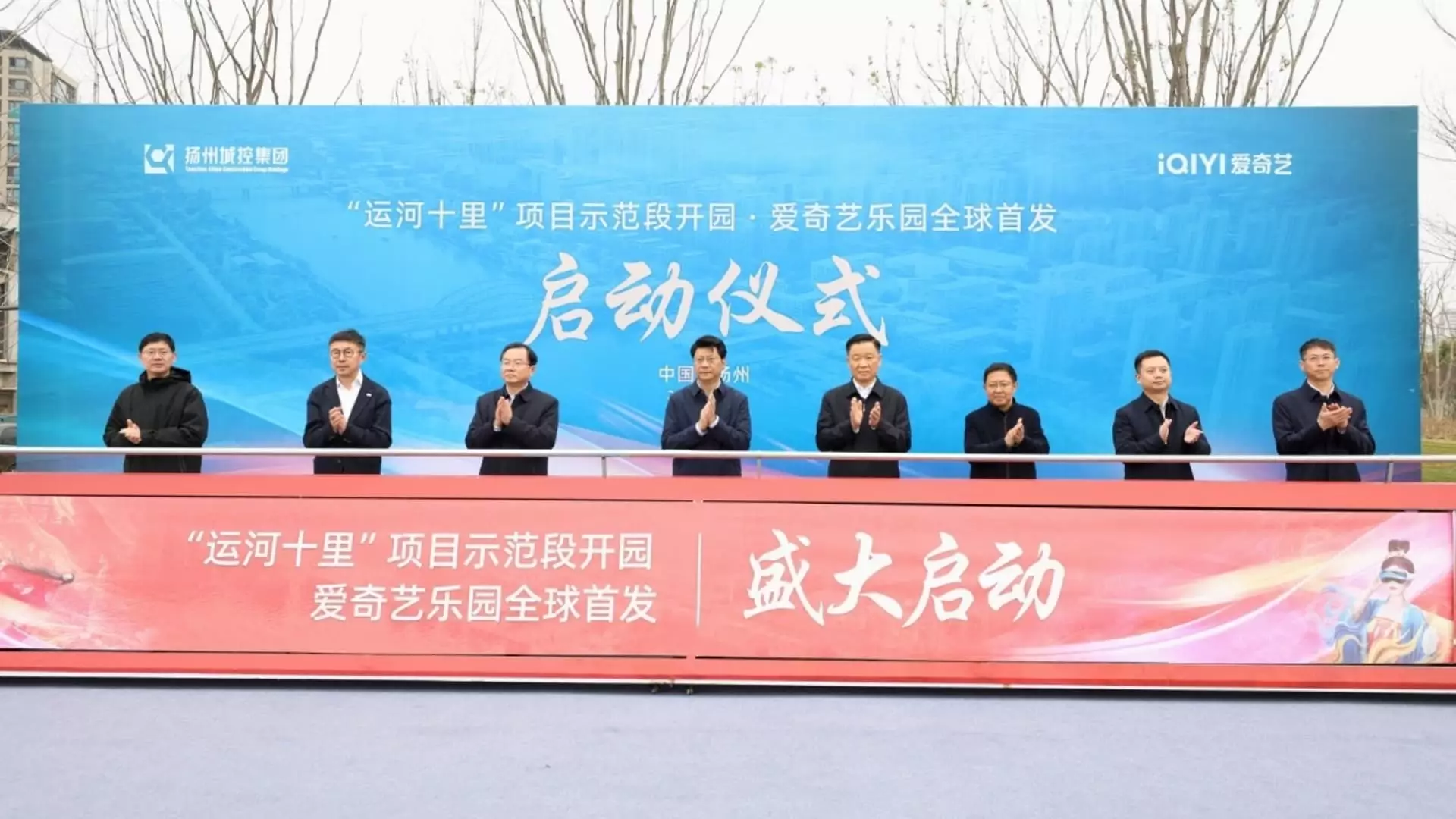In what can only be described as a dazzling pivot in the world of entertainment and consumer experiences, Chinese video streaming giant iQiyi has announced the forthcoming opening of its very own theme park, “iQiyi Land.” Set to launch in Yangzhou, this ambitious project embodies a significant step away from traditional media consumption into fully immersive entertainment—a move that raises critical questions about the future landscape of entertainment in China. This is a gamble—one that could either pay off handsomely or leave investors with a bitter taste.
Betting on Experiences Amidst Economic Uncertainty
While it may seem counterintuitive to dive into large-scale projects during a time of sluggish retail performance, iQiyi is betting on a trend that has gripped consumers: the insatiable desire for unique experiences. With retail sales floundering, many companies are transitioning to experiences that engage consumers more directly. Disney, Warner Bros., and Legoland are in on the act, each attempting to forge strong emotional connections through theme parks. However, does this mean iQiyi’s strategy is prudent, or is it simply wishful thinking dressed in the frivolity of exciting rides and characters?
As much as iQiyi is aiming to capture audience interest with VR and interactive attractions, it must contend with economic factors that can’t be ignored. The consumer price index barely budged last year, indicating a cautious spending culture. Are consumers really ready to shell out for immersive experiences when their funds may be tighter than in previous times? Only time will tell if this push toward experiential entertainment proves to be a visionary stroke or a regrettable oversight in a shaky economic atmosphere.
The Technological Edge: A Double-Edged Sword
iQiyi is boasting that its unique integration of virtual reality technology will create experiences previously unattainable in theme parks. This innovation could offer users an exhilarating glimpse into fantasy worlds, bringing beloved characters and stories to life. However, this heavy investment in tech innovation presents both a thrilling opportunity and a daunting risk.
What happens when the initial excitement of VR rides wears off and novelty ebbs into mundanity? The challenge lies not only in wowing users at the onset but in keeping them coming back for a second, third, or fourth visit. Remember the hype behind VR gaming just a few years ago? It has faded for many due to repetitive content and waning excitement. iQiyi must ensure that it continually updates its offerings to keep the thrill alive, or it risks becoming yet another victim of its own early promise. The expectation of continuous innovation can place an immense, possibly unsustainable, pressure on the company.
Competitive Landscape: Too Many Fish in the Sea?
The landscape for entertainment experiences in China is increasingly crowded. With giants like Disney, Comcast, and Warner Bros. making serious plays for consumer engagement, iQiyi may find itself in a David versus Goliath scenario. While it’s admirable that iQiyi wants to carve its niche, one must question if its entry into the theme park sector isn’t overshadowed by existing heavyweights.
Can a company primarily known for streaming content truly compete with established infrastuctures years in the making? The hurdles are considerable—regulatory concerns, construction delays, and the ever-changing whims of consumer preferences can all derail even the best-laid plans. So, how does iQiyi plan to differentiate itself? A compelling storyline adorned with innovative attractions might not be enough to sway consumers who are already enamored with the tried-and-true offerings of its competitors.
Consumer Sentiment: Navigating Public Expectations
As the theme park opens, the important factor will be how consumers perceive this new venture. Already, iQiyi’s share prices have seen a predictable uptick, but will they sustain momentum? Exhibiting the tendency for fluctuating spending habits and consumer priorities, public sentiment is inherently unpredictable. It is critical that iQiyi not only stirs excitement but genuinely connects with its audience.
In a climate where consumers are increasingly skeptical of mega-corporations and their Motives, iQiyi must engage authentically to cultivate loyalty. If the park does not meet consumer expectations, the backlash could deter future investments and setback the company’s broader goals of expanding the experience economy.
The Future: A Gamble with High Stakes
While “iQiyi Land” offers tantalizing prospects of innovation and excitement, the stakes could not be higher for the company. As everything from economic conditions to competitive pressures loom large, both iQiyi and its audience are left to wonder: is the experience economy truly the present and future of entertainment in China? Or will it unveil itself as a fleeting trend that falters under scrutiny? Only time will tell, but one thing is certain—every thrill ride starts with a leap of faith.

